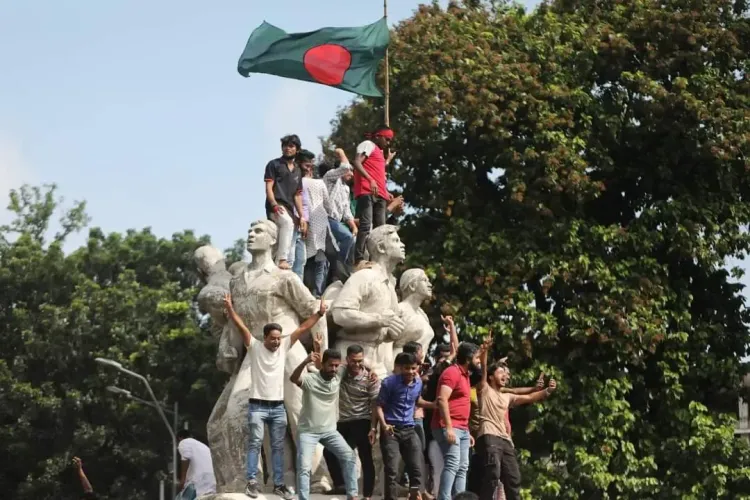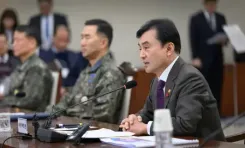Are explosive claims shaking Dhaka? Ex-Minister implicates US Aid giant and Clintons in Hasina's demise

Synopsis
Key Takeaways
- Former Minister Chowdhury alleges a Western conspiracy
- USAID and the Clintons are implicated
- Claims of NGO funding fueling unrest
- US government denies involvement
- Political implications for Bangladesh’s future
New Delhi, Nov 9 (NationPress) In a shocking interview that has sent ripples through South Asian diplomatic channels, a significant supporter of ousted Prime Minister Sheikh Hasina has made a series of bold allegations, framing the 2024 Bangladesh uprising as a carefully executed Western scheme.
Mohibul Hasan Chowdhury, who previously served as Hasina's shipping minister, claimed that the United States Agency for International Development (USAID)—formerly the expansive humanitarian arm of the US government—and the well-known Clinton family were key players behind the student-led demonstrations that ended Hasina's 15-year rule, according to an exclusive report by ‘Russia Today’ as cited by NDTV.
Chowdhury was direct in his assertions, labeling the turmoil a "deliberately orchestrated" regime-change strategy driven by obscure NGO financing, as reported by NDTV.
"Certain actions from some NGOs, particularly those based in the US—I refer to USAID and the International Republican Institute—have been campaigning against our government since 2018," he alleged, asserting that millions in USAID funds disappeared into "secretive" channels to incite disorder.
The former minister emphasized a "connection" between the Clintons and interim leader Muhammad Yunus, the Nobel-laureate in microfinance now directing Bangladesh’s transitional phase.
"This connection signifies a more profound effort by the Clinton Foundation and Yunus to advocate for regime change masked as democracy and development," Chowdhury claimed, linking it to Hasina's resistance against US pressures—such as her refusal to concede to demands for a military presence on the strategically important St Martin's Island, a jewel in the Bay of Bengal once defended by her father, independence hero Sheikh Mujibur Rahman.
This interview echoes Hasina's own post-exile criticisms, where she accused Yunus of "selling the nation to the US". After fleeing Dhaka on August 5, 2024, during a mob's assault on her Ganabhaban residence, she arrived in Delhi, where she currently remains under India's protective shelter.
The violence in July-August, ignited by discontent over job quotas, resulted in at least 700 fatalities and sparked attacks on Hindu minorities—wounds that persist as Yunus's administration shifts focus toward Pakistan, the very nation blamed for the 1971 genocide that led to Bangladesh's creation.
As anticipated, Washington dismissed these claims as "ridiculous" and "entirely false."
In August 2024, White House Press Secretary Karine Jean-Pierre and State Department deputy Vedant Patel rejected similar allegations from Hasina's camp as misinformation, asserting that the uprising was a grassroots response to corruption and inequality.
US analysts like Michael Kugelman from the Wilson Center supported this, stating there is "no credible evidence" of interference.
Critics characterize these allegations as the bitter remarks of a deposed regime, yet they contribute to a narrative of neo-colonial manipulation in the Global South.
As Yunus's interim administration looks toward early elections, the shadow of foreign involvement looms large, threatening to fracture Bangladesh's delicate peace.
Hasina's Awami League, currently barred from participating in elections, is considering independent campaigns, vowing to make a comeback. For the moment, the Clinton-Yunus "connection" remains an accusation rather than a conviction—but in the volatile atmosphere of Dhaka, whispers can ignite immense flames.










